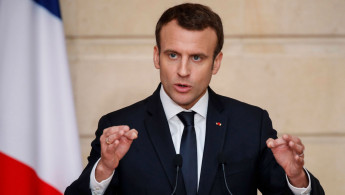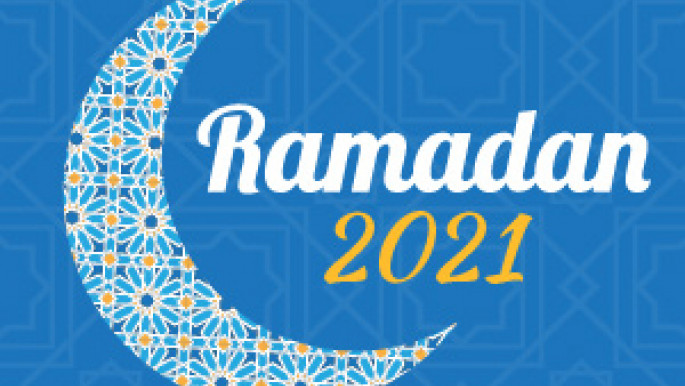France's Macron accused of spreading 'fake news' about Muslim girls
French President Emmanuel Macron wrote that Muslim children were being forced to wear the niqab while being raised 'in hatred'.
4 min read
Macron denied his government had stoked bigotry against Muslims [Getty]
France's President Emmanuel Macron is facing further backlash after alleging that young French Muslim girls are being forced into wearing the full face veil.
Fresh anger around Macron's controversial statements comes after the Financial Times published a letter by the French president defending his policies in the wake of a series of extremist attacks.
"Since 2015 it has become clear, and I said this even before I became president, that there are breeding grounds for terrorists in France," Macron wrote in the letter.
"If you do not believe me, read the social media postings of hatred shared in the name of a distorted Islam that resulted in [Samuel] Paty's death. Visit the districts where small girls aged three or four are wearing a full veil, separated from boys, and, from a very young age, separated from the rest of society, raised in hatred of France's values."
A number of Muslim figures have since hit back at the French president over the controversial claims, The Independent reported.
The full veil that covers all of the head but the eyes, also referred to as a niqab or burka, has been banned in France since 2011.
As such, there has not been a single recorded incident of a young child wearing the niqab or burka in France.
Marwan Muhammad, a human rights activist who fact-checks claims about Muslims in France, described the allegations as "not substantiated by any evidence whatsoever".
Macron "is using a British outlet to spread fake news about Muslims in France", said Nadia Henni-Moulai, a prominent French writer.
"This is highly inappropriate for a head of state," Henni-Moulai was quoted as saying by The Independent.
'Hostile environment'
Macron was responding to a column published by the Financial Times earlier this week.
The opinion article, written by journalist Mehreen Khan and titled "Macron's war on 'Islamic separatism' only divides France further" was later removed from the newspaper's website.
Khan's column argued that Macron's government had stoked "moral panic" in the wake of extremist attacks and was subjecting France's six-million strong Muslim population to a "hostile environment" rather than enlisting them as allies in the fight against extremism.
"Muslims are being asked to prove their loyalty to the state and its values. But in France they are asked to do so while hiding visible signs of their religion for fear of offending the state," Khan wrote. "They are admonished for not condemning terrorism loudly enough and expected to bear collective responsibility for nihilistic crimes, which, in the case of recent attacks, were carried out by foreigners."
An editorial note replacing the column said it had been removed after it "emerged that it contained factual errors".
In his November 4 letter to the newspaper, President Macron accused Khan of "distorting" his own statements.
Read more: Macron faces backlash after claiming 'secularism never killed anyone'
"The piece misquoted me, substituting 'Islamic separatism' — a term that I have never used — for 'Islamist separatism', which is a reality in my country. It accused me of stigmatising French Muslims for electoral purposes and of fostering a climate of fear and suspicion towards them," Macron wrote.
Fresh anger around Macron's controversial statements comes after the Financial Times published a letter by the French president defending his policies in the wake of a series of extremist attacks.
"Since 2015 it has become clear, and I said this even before I became president, that there are breeding grounds for terrorists in France," Macron wrote in the letter.
"If you do not believe me, read the social media postings of hatred shared in the name of a distorted Islam that resulted in [Samuel] Paty's death. Visit the districts where small girls aged three or four are wearing a full veil, separated from boys, and, from a very young age, separated from the rest of society, raised in hatred of France's values."
A number of Muslim figures have since hit back at the French president over the controversial claims, The Independent reported.
The full veil that covers all of the head but the eyes, also referred to as a niqab or burka, has been banned in France since 2011.
As such, there has not been a single recorded incident of a young child wearing the niqab or burka in France.
Marwan Muhammad, a human rights activist who fact-checks claims about Muslims in France, described the allegations as "not substantiated by any evidence whatsoever".
Macron "is using a British outlet to spread fake news about Muslims in France", said Nadia Henni-Moulai, a prominent French writer.
"This is highly inappropriate for a head of state," Henni-Moulai was quoted as saying by The Independent.
'Hostile environment'
Macron was responding to a column published by the Financial Times earlier this week.
|
|
The opinion article, written by journalist Mehreen Khan and titled "Macron's war on 'Islamic separatism' only divides France further" was later removed from the newspaper's website.
Khan's column argued that Macron's government had stoked "moral panic" in the wake of extremist attacks and was subjecting France's six-million strong Muslim population to a "hostile environment" rather than enlisting them as allies in the fight against extremism.
"Muslims are being asked to prove their loyalty to the state and its values. But in France they are asked to do so while hiding visible signs of their religion for fear of offending the state," Khan wrote. "They are admonished for not condemning terrorism loudly enough and expected to bear collective responsibility for nihilistic crimes, which, in the case of recent attacks, were carried out by foreigners."
An editorial note replacing the column said it had been removed after it "emerged that it contained factual errors".
In his November 4 letter to the newspaper, President Macron accused Khan of "distorting" his own statements.
Read more: Macron faces backlash after claiming 'secularism never killed anyone'
"The piece misquoted me, substituting 'Islamic separatism' — a term that I have never used — for 'Islamist separatism', which is a reality in my country. It accused me of stigmatising French Muslims for electoral purposes and of fostering a climate of fear and suspicion towards them," Macron wrote.
|
|
"Speak to government prefects who are confronted on the ground with hundreds of radicalised individuals, who we fear may, at any moment, take a knife and kill people," he added.
"This is what France is fighting against — designs of hatred and death that threaten its children — never against Islam. We oppose deception, fanaticism, violent extremism. Not a religion."
The French government's response to recent extremist attacks has also earned condemnation from the leaders of several Muslim-majority countries.
Turkey's President Recep Tayyip Erdogan backed popular calls for a boycott of French goods after Macron voiced support for caricatures of Islam's Prophet Mohammed in the wake of a schoolteacher's beheading.
Follow us on Facebook, Twitter and Instagram to stay connected
The French government's response to recent extremist attacks has also earned condemnation from the leaders of several Muslim-majority countries.
Turkey's President Recep Tayyip Erdogan backed popular calls for a boycott of French goods after Macron voiced support for caricatures of Islam's Prophet Mohammed in the wake of a schoolteacher's beheading.
Follow us on Facebook, Twitter and Instagram to stay connected






 Follow the Middle East's top stories in English at The New Arab on Google News
Follow the Middle East's top stories in English at The New Arab on Google News


